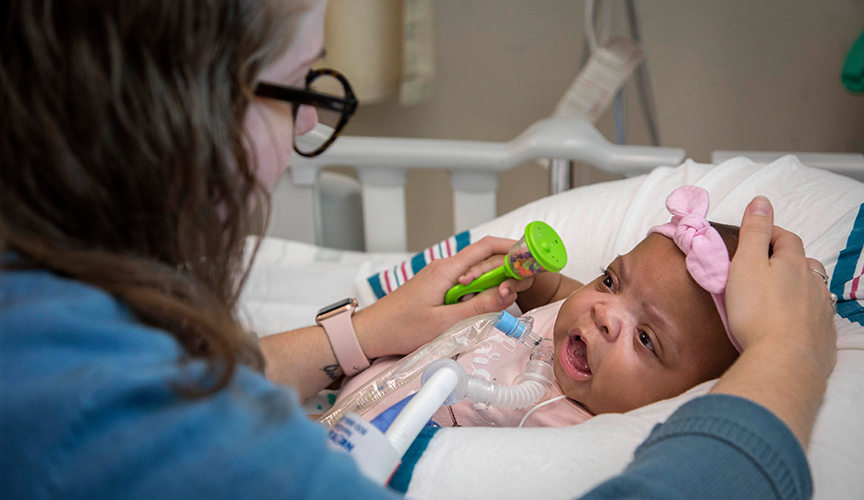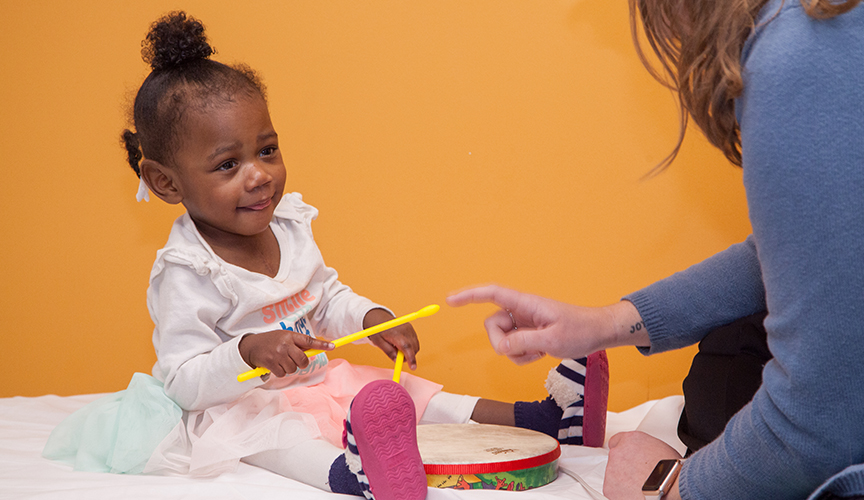Hitting the Right Note
Two-year-old Zecari Taylor spent more than 200 days waiting for a heart transplant at Le Bonheur. Those long days were filled with needle sticks, procedures and an endless stream of doctors.
And through it all, only one person could make Zecari perk up just by entering the room: Music Therapist, Taylor Brown, MT-BC, NICU MT.
“Zecari loves music and loves to sing,” said Zecari’s dad, Christopher. “Taylor helped her a lot – she helped her recover faster.”
As Le Bonheur’s music therapist, Brown is part of the 31-member Child Life team who helps children cope with the difficulties of being in the hospital. Through the use of musical therapy, Le Bonheur is able to provide distractions, encourage development and reduce costs across the hospital.
Benefits for Babies
Music therapy is the clinical- and evidence-based use of music by a credentialed music therapist to help patients reach individualized goals during their hospital stay.
Neonatologist Mark Weems, MD, is one of several physicians who regularly employs music therapy techniques with his patients. He has seen firsthand the measurable medical benefits that music therapy provides babies in the Neonatal Intensive Care Unit (NICU) – the area of the hospital in which Brown spends the majority of her time.
“Music therapy during stressful procedures in the NICU helps our babies maintain lower heart rates and higher oxygen saturation,” said Weems. “The babies are less stressed and more able to tolerate the painful procedures they must frequently undergo.”
In addition to assisting with procedures, Brown works with parents to teach increased communication and interaction with their child, whether singing their favorite songs or educating parents on noise levels and infant hearing.
“Parents are able to be involved as much as they want,” said Brown. “They get to be a secondary ‘patient’ and participate in music therapy or just sit back and watch their child be a kid again.”
One technique Brown teaches parents is multimodal neurologic enhancement – progressive muscle relaxation used for auditory, tactile and vestibular stimulation. This process uses singing, humming, touching and rocking for babies to acclimate to the stimulation of the world and create a bonding experience for parents.

Music therapy during stressful procedures in the NICU helps our babies maintain lower heart rates and higher oxygen saturation. The babies are less stressed and more able to tolerate the painful procedures they must frequently undergo.
Research from the Journal of Pediatric Nursing* shows music therapy is also a cost-saving measure. Providing a calm and soothing environment reduces the amount of patients who have to be sedated to undergo procedures such as CT scans, ECHOs, IV starts and EEGs. Hospitals can save time on sedation medication and cost of staff presence.
Weems commonly uses music therapy during routine infant retinal eye exams. This process can be stressful, leading to increased oxygen requirements, periods of exaggerated mood change and frequent apneic episodes after the exam.
But since Brown has begun implementing music therapy during these exams, Weems has seen measurable improvements among the tiniest babies in the unit.
“Music therapy during the eye exam seems to help these fragile infants tolerate the exam and remain stable afterward,” said Weems.
How Music Therapy Is Used
A Unique Skill Set
Music therapy encompasses a unique combination of disciplines: psychology, counseling, medicine and music. Musical ability and a love of music is key, but a pediatric medical music therapist must also be an expert in childhood development, hospital procedures and the medical field, according to the professional requirements delineated by the American Music Therapy Association.

For Brown, the intersection of these aspects was the perfect fit. She received her undergraduate degree in music and psychology and subsequently completed an equivalency program in music therapy. She finds that the results of music therapy are a thrill to watch.
“Music therapy so beautifully combines all of my passions rolled into a profession – psychology, helping people, counseling and music,” said Brown. “Seeing a baby with a rough experience from day one give the faintest smile in response to music makes what I do worth it every time.”
Future Impact
Brown currently focuses her time in the NICU and consults with patients elsewhere in the hospital who could benefit from music therapy. But she has hopes to further expand the music therapy program at Le Bonheur as part of a growing Child Life team led by Director of Child Life, Jessica Kellough Liles, CCLS.
“Taylor is able to connect the power of music with research and science to support even the tiniest patients in our care,” said Liles. “We hope to continue to grow this program so more patients and families can receive the services provided by a board-certified music therapist.”
In the NICU, Brown’s work with the babies in Weems’ care lays the foundation for a positive future impact on a child beyond the temporary reduction of stress and anxiety.
“Music therapy has the potential to improve long-term neurodevelopmental outcomes,” said Weems. “While stressful and painful procedures are usually necessary for babies in the NICU, frequent pain and chronic stress has a negative impact on long-term neurodevelopment. By reducing stress in the neonatal period with music therapy, we can positively impact the child for years to come.”
*DeLoach Walworth, Darcy. Procedural-Support Music Therapy in the Healthcare Setting: A Cost–Effectiveness Analysis. Journal of Pediatric Nursing: Nursing Care of Children and Families, Volume 20, Issue 4, 276 – 284.
Help us provide the best care for kids.
Le Bonheur Children's Hospital depends on the generosity of friends like you to help us serve 250,000 children each year, regardless of their family’s ability to pay. Every gift helps us improve the lives of children.
Donate Now















